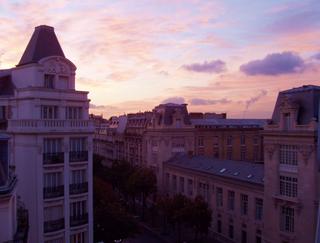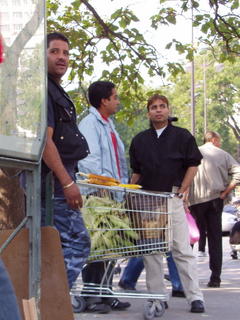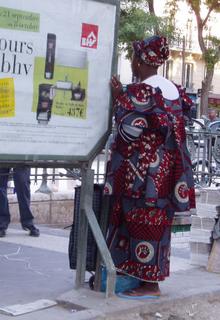
With no elevator, the trek up the stairs can offer quite the challenge after a long day’s work. However, the view makes it all worth the while. My apartment is quite comfortable, equipped with most modern amenities. My room mate Fanny makes Paris that much more enchanting with her quintenssiel French allure, sweet smile and warm disposition.
 The office is located at the ground floor of a large cement building called an HLM (low income housing). Our team is composed of 4 social workers, two specialized trainers, one other intern and myself. We are all women of different backgrounds making for a dynamic environment and many rich discussions. The Madame in charge has Jewish origins, there is an Algerian who lived her whole life in Germany, a Congolese woman, another who worked with the United Nations and Unesco in her country of Central Africa. They are sharp, competent individuals with very big, caring hearts.
The office is located at the ground floor of a large cement building called an HLM (low income housing). Our team is composed of 4 social workers, two specialized trainers, one other intern and myself. We are all women of different backgrounds making for a dynamic environment and many rich discussions. The Madame in charge has Jewish origins, there is an Algerian who lived her whole life in Germany, a Congolese woman, another who worked with the United Nations and Unesco in her country of Central Africa. They are sharp, competent individuals with very big, caring hearts.
I’m quickly learning the ins and outs of immigration policy. Basically, it has recently become much more difficult to be granted residency status in France. This however, has done nothing to reduce the number of people already living in the country with out papers. I’ve had a chance to meet a great number of these “sans papiers” who come to our office with heart-wrenching stories, asking for our help.
They flee their countries for a wide range of reasons… to escape civil war, to seek political asylum, because of acute poverty or the lack of medical care, or so that their kids can get an education. For the most part, the State does not recognize their existence. They therefore live in the shadows, a miserable existence that still manages to pale in comparison to the dispair in their homelands. I leave everyday with a lot of homework. I want to know the history of the wars in the Congo which caused so many to seek refuge, why the Algerian man was held captive in his country by the militia for 3 years, why the Tamils are persecuted in Sri Lanka.
We also help immigrants who have achieved legal status. The greatest challenge for them is finding a job. With a very high unemployment rate, the average time it takes to find a job in France is about a year, and of course, much longer for a foreigner with mediocre language skills. To make matters worse, it is impossible to get a lease without proof of a stable income. With a 7-10 year waiting list, few are able to get government subsidized housing. The other day, a Sri-Lankan man came in pleading for us to help him find lodging. His wife and six children recently received permission to enter France and have since been crammed in his small studio apartment. An unhappy landlord is refusing to renew their lease. Both parents unemployed, they have very little chance of finding new accommodations. It is not uncommon to see people in these types of predicaments forced on the streets.

Each case is so unique, laden with cultural specificities, historical accounts which amount to differing degrees of difficulty. Just in my third week, my perspective has widened in scope and will continue to as I encounter men, women and children from all corners of the earth, all hoping to find a more bearable existence.
These experiences are not only extremely rich and educational but help me to appreciate just how blessed I am. It also drives me to do whatever I can to help those who need it most.



